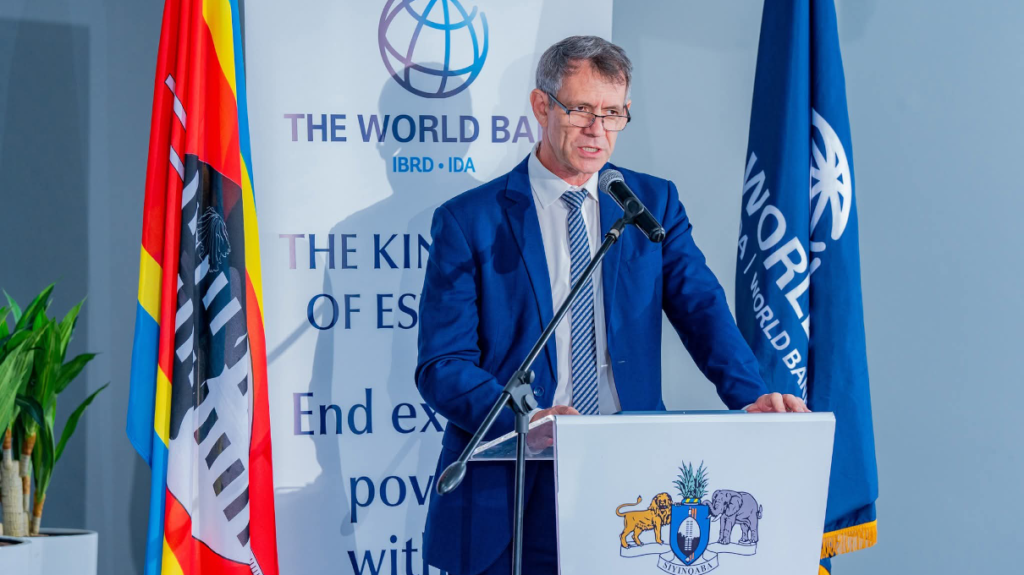
The Minister of Finance, Neal Rijkenberg, has called for a united national effort to accelerate digital transformation, describing it as a critical driver of inclusive economic growth and development.
Speaking during the official launch of the second Eswatini Economic Update report, supported by the World Bank, Minister Rijkenberg emphasized that digital technologies are no longer optional; they are essential tools for progress across all sectors.
“Digital technologies enhance productivity. They create jobs, reduce costs, boost revenue, connect the disconnected, and most importantly, bring government closer to its citizens,” he said.
The report identifies three pressing challenges: uneven broadband coverage, shortages in digital skills, and limited access to innovation financing, all of which need urgent policy and investment attention.
However, with the 2025 edition of the Eswatini Economic Update focusing on digital development, the Finance Minister highlighted how countries like Rwanda, Kenya, and Ghana have leveraged digital tools to address real-world problems, from streamlining public service delivery to expanding access to financial services and improving tax compliance.
“What these countries have in common is not just digital infrastructure, it is a commitment to use digital tools to solve real problems. And that is the mindset we must adopt in Eswatini.”
For a small and geographically isolated country like Eswatini, virtual connectivity is just as vital as physical infrastructure for accessing markets, sharing information, and increasing productivity. According to the report, digitalization facilitates the movement of products, services, and ideas across borders, thus reducing economic distances and costs.

Encouragingly, mobile broadband coverage has improved—99% of people now have access to both 2G and 3G, and 80% have access to 4G. Farmers are already beginning to reap the benefits of digital tools like NaPHIS, AMIS, and GeoFarmer, which improve market access and productivity.
While mobile broadband penetration is high, fixed broadband covers just 3% of the population, and the cost of 2GB of data stands at 3.5% of GNI per capita, far above the global affordability target of 2%.
The digital gap is also seen among businesses: nearly 43% of SMEs report challenges adopting digital tools, and over 90% of person-to-business transactions still rely on cash. Eswatini lags behind its peers in e-commerce adoption and e-government services.
The report highlights that these gaps stem from underlying constraints such as: high broadband costs, fragmented government systems, weak digital inclusion policies, institutional coordination failures, shortage of skilled professionals, and a fragile innovation ecosystem.
From a fiscal standpoint, the Ministry of Finance is positioning itself as an enabler of digital transformation. “We support sound public investment in digital infrastructure, mobilize development finance, and encourage private sector participation,” Rijkenberg said.
He also cited ongoing efforts to modernize public financial management systems through digitalization, including the implementation of the Integrated Financial Management Information System (IFMS), e-procurement, and digital payments.
These reforms, he said, aim to increase efficiency and trust in how public resources are allocated and used.

“This is not an ICT agenda. It is a whole-of-government priority, and a whole-of-society challenge. That is why we are proud to support initiatives like the Government In Your Hand strategy, and why we welcome today’s dialogue to forge a shared vision.”
The report offers five policy recommendations to help Eswatini harness the full potential of digital technologies:
1.Strengthening digital governance and institutional coordination: Clarifying mandates and improving accountability acrossministries will drive better implementation. A national change management programme is also proposed to encourage adoption across the public sector.
2. Accelerating EPTC reforms: Stabilizing EPTC through financial restructuring and introducing open access reforms can make the telecom market more competitive and efficient. Long-term options include privatization to enhance service delivery.
3. Building interoperable digital public infrastructure (DPI): Digitizing the National Population Register and ensuring system interoperability will enable seamless delivery of health, education, and social services.
4. Developing a National Digital Skills Action Plan: The report calls for TVET and university programmes to focus on areas such as AI, cybersecurity, and software engineering. Partnerships with the private sector will also be key in fostering innovation.
5. Fostering a competitive digital innovation ecosystem: Creating an enabling environment for startups and SMEs includes enhancing intellectual property protections, improving access to capital, and expanding opportunities through platforms like e-government procurement.
